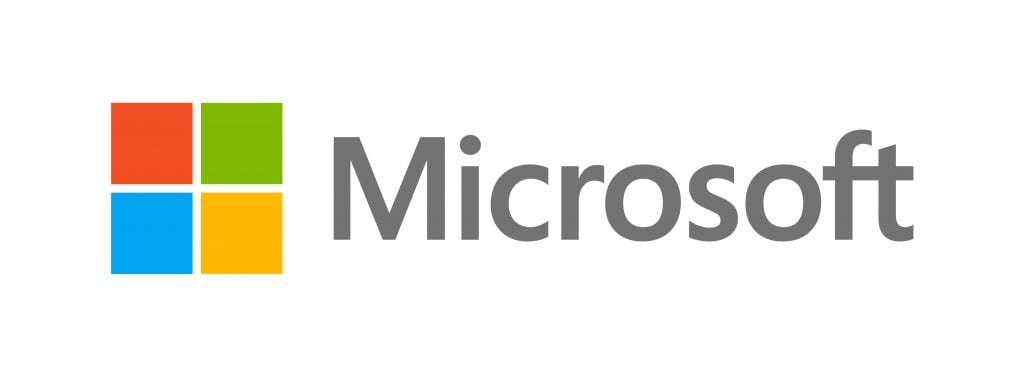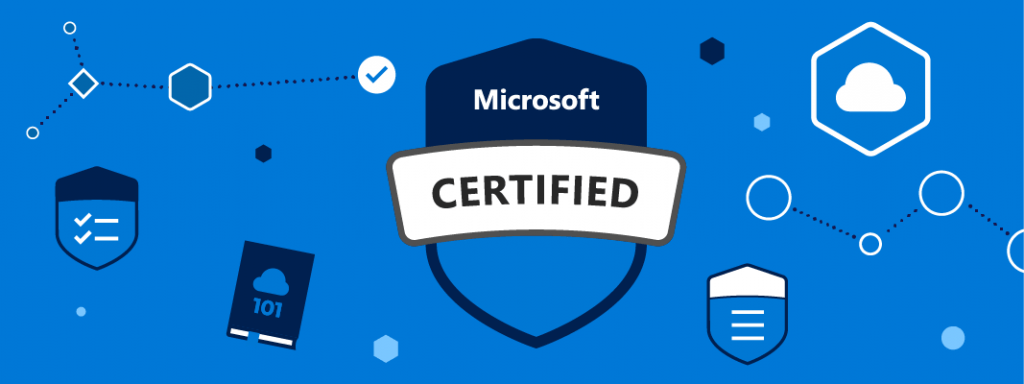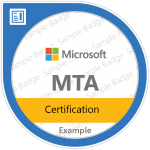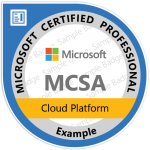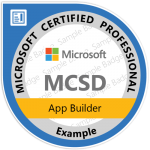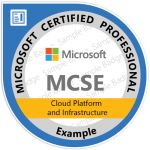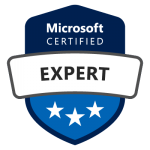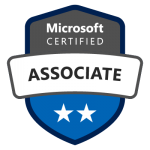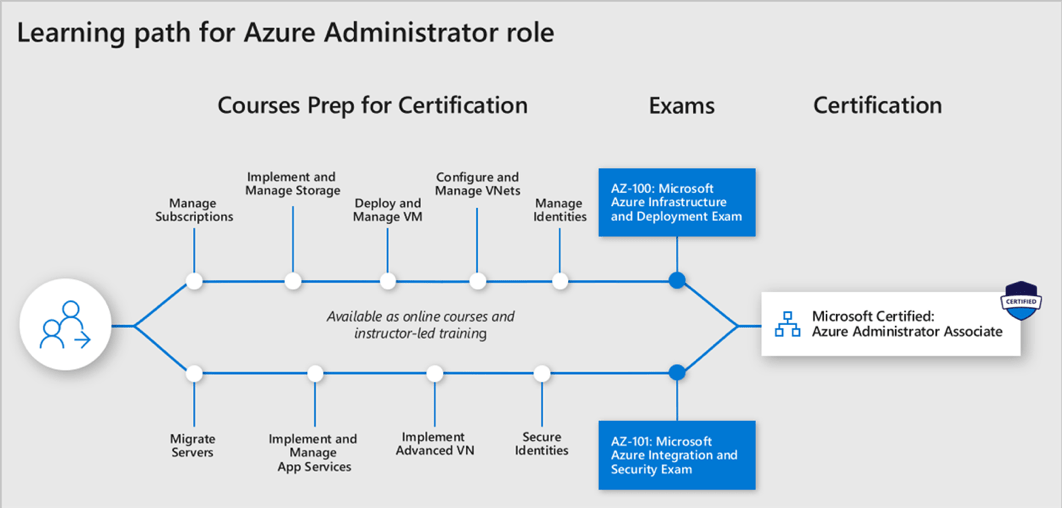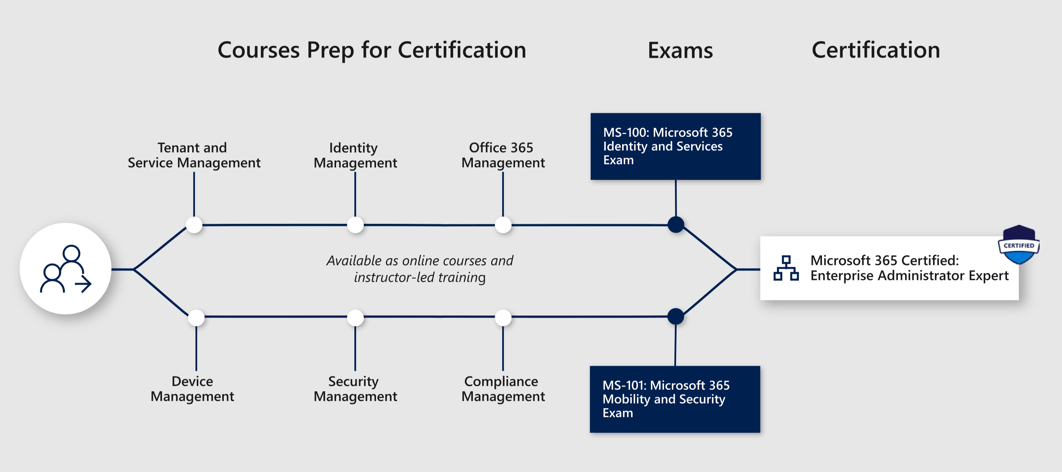Microsoft Certification Guide
One of the best ways to boost your IT career is to get a Microsoft Certification. Whether you work (or want to work) as an IT professional, analyst, developer, system or database administrator, a Microsoft Certification can help you prove your skills and increase your chances of getting hired or promoted.
Microsoft offers a number of certifications and despite the recent changes made by the Microsoft Training department to simplify the certification paths and categories, some students still find it difficult to decide which path to follow and which certifications to pursue.
We created this guide to help you understand how Microsoft certifications work so that you can decide which certifications are more suited for your career.
Microsoft Training Learning Options
We all learn in different ways, and Microsoft offers multiple ways to get certified. You can choose from accelerated bootcamp training, instructor led (classroom live), virtual classroom live and online courses.
Accelerated Bootcamp Training
This is the fastest and most reliable way to get Microsoft Certified. Accelerated Bootcamp training (sometimes called “Microsoft Boot camps“), allows students to learn technologies in a fraction of the time of traditional classroom training.
Certification Camps exclusively delivers specialized training using the Microsoft Boot Camp format. Our training model blends knowledge and certification prep into one solution. This “hybrid” solution is designed for you to learn the objectives of the exam, not just “learn the exam”. We offer “All-Inclusive” pricing with airfare, lodging, transportation, meals, books & test vouchers.
Instructor Led Training
Interact face-to-face with Microsoft certified trainers. For those looking to develop their skills and technical expertise, you can learn from the experts themselves. You can choose from two different options with Instructor-Led Training:
- Classroom live (in class training)
- Virtual Classroom Live (Remotely attend and interact with the instructor led-live class)
Available Certifications
Each certification path includes a number of certifications, and some certifications are common in a number of paths.
Before getting into the details of each path, let’s first clarify what are the different types of certifications you can get.
- MTA
- MCSA
- MCSD
- MCSE
- MCE
- MCA
MTA – Microsoft Technology Associate. It shows that the certification holder has fundamental knowledge in a wide range of technical concepts. The MTA certification is the first certification you can get in the Mobility, Cloud, Productivity, Data and App Builder paths.
Once you pass ANY of the Microsoft exams, then you become an MTA holder for the particular product or technology.
The MTA is the lowest level certification you can achieve.
MTA fills the continued need for the generalist among Microsoft Technology. This certification training provides a strong introduction to IT and all its associated terminology. This certification is designed for both IT as well as non-IT professionals and is an entry-level step to understanding and mastering current Microsoft technology. You will learn everything from networking and security to the most common operating system in the world, Microsoft Windows.
In MTA certification training, you’ll receive a condensed introduction and overview of the key concepts and technology frameworks that are required to deliver IT services.
MCSA – Microsoft Certified Solutions Associate. It’s an entry level certification but a step above MTA. To get an MCSA you need to pass two or more exams (depending on the certification).
The MCSA is available in all certification paths and a requirement to get to the more advanced Microsoft Certifications (MCSE and MCSD).
MCSD – Microsoft Certified Solutions Developer. That’s the most popular Microsoft Certification for Developers. It’s the top certification you can achieve if you follow the Apps Builder path. The MCSD is a step above MCSA and equivalent to MCSE.
MCSE: Microsoft Certified Solutions Expert. For all other paths (besides Apps Builder), the most advanced certification you can get is the MCSE. It’s also very popular and widely recognized in the IT industry.
New Role Based Certifications for Microsoft Azure and Office
MCE Azure Administrator – An Azure Administrator is responsible for implementing, monitoring, and maintaining Microsoft Azure solutions, including major services related to compute, storage, network, and security.
MCE Azure Developer –This certification is recognized by businesses all over the world. Expand your Azure development skills to meet future business needs with these certifications.
MCE Azure Architect – Master the skills needed to design Azure based solutions. A Microsoft Azure Solutions Architect must have expertise in compute, network, storage, and security.
Microsoft 365 Enterprise Administrator – This certification gives you the skills to deploy, administrate, and troubleshoot Windows 10 and Office 365 and is highly valued by all industries using Windows and Office 365 for their business.
Microsoft Certifications Roadmap
MCSA Windows Server 2016
Achieving the Microsoft Certified Solutions Associate (MCSA): Windows Server 2016 certification verifies that you have essential Windows Server 2016 skills reach across multiple solution areas. This premier certification shows your ability to operate Windows Server 2016 in a contemporary business context. This certification ranked in the top paying certifications of 2018.
There are three exams to pass to earn your MCSA Windows Server 2016 certificate.
- Exam 70-740: Installation, Storage, and Compute with Windows Server 2016
- Exam 70-741: Networking with Windows Server 2016
- Exam 70-742: Identity with Windows Server 2016
Cloud Platform & Infrastructure Path (MCSE Cloud Platform & Infrastructure)
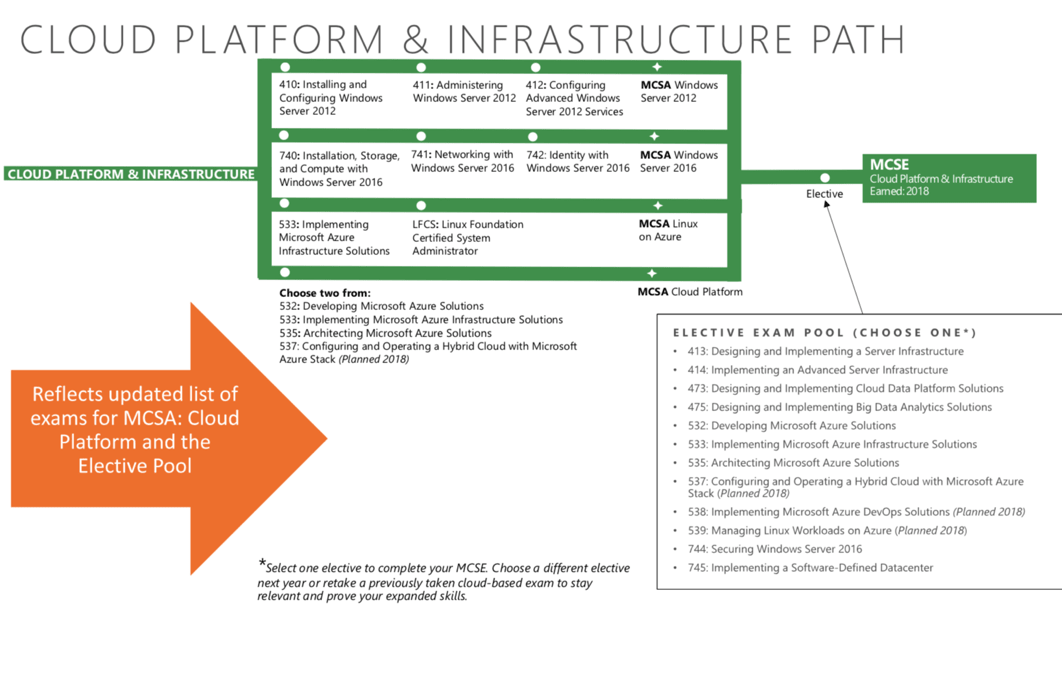
MCSE Cloud Platform & Infrastructure Path
Microsoft’s Certified Solutions Expert (MCSE): Cloud Platform and Infrastructure certification shows your skills in running a highly efficient and data center, and your expertise in cloud technologies, identity management, systems management, storage, virtualization, and networking.
Achieving an MCSE: Cloud Platform and Infrastructure certification gives you credentials for jobs such as cloud administrator, cloud architect, computer support specialist, and information security analyst.
Here is how you earn your MCSE in Cloud Platform and Infrastructure:
Step 1: Achieve one of these MCSA (Microsoft Certified Solutions Associate) certifications.
- MCSA Windows Server 2016
Step 2: Pass one of these elected exams.
- 70-413: Designing and Implementing a Server Infrastructure
- 70-414: Implementing an Advanced Server Infrastructure
- 70-473: Designing and Implementing Cloud Data Platform Solutions
- 70-475: Designing and Implementing Big Data Analytics Solutions
- 70-532: Developing Microsoft Azure Solutions
- 70-533: Implementing Microsoft Azure Infrastructure Solutions
- 70-535: Architecting Microsoft Azure Solutions
- 70-537: Configuration and Operating a Hybrid Cloud with Microsoft Azure Stack
- 70-744: Securing Windows Server 2016
- 70-745: Implementing a Software-Defined Datacenter
Step 3: Earn your MCSE Cloud Platform and Infrastructure
Step 4: Continued Education
This certification does not expire.
Your MCSA: Windows Server 2016 certification equips you for a position as a network or computer systems administrator or as a computer network specialist, and it is the first step on the way to becoming a Microsoft Certified Solutions Expert (MCSE).
There are three exams to pass to earn your MCSA Windows Server 2016 certificate.
- Exam 70-740: Installation, Storage, and Compute with Windows Server 2016
- Exam 70-741: Networking with Windows Server 2016
- Exam 70-742: Identity with Windows Server 2016
MCSA SQL 2016 Database Development
Earning an MCSA: SQL 2016 Database Development certification validates your skills in building and implementing databases across organizations, and will qualify you for a position as a database developer.
There are just two exams required for the MCSA SQL 2016 Database Development certification.
- Exam 70-761: Querying Data with Transact-SQL
- Exam 70-762: Developing SQL Databases
MCSA SQL 2016 Database Administration
You can earn your MCSA: SQL 2016 Database Administration certification and validate your skills in database installation, maintenance, configuration, as well as provisioning tasks. It will qualify you for position as a database administrator or infrastructure specialist.
There are just two exams required to earn your MCSA SQL 2016 Database Administration certificate.
- Exam 70-764: Administering a SQL Database Infrastructure
- Exam 70-765: Provisioning SQL Databases
MCSA: SQL 2016 Business Intelligence Development
Your MCSA: SQL 2016 Business Intelligence Development certification shows your ability to:
- Extract, transform, and load (ETL).
- Use data warehouse skills,
- Implement BI solutions using multidimensional and tabular data models and online analytical processing (OLAP) cubes.
This certification will enable you access to a position as a BI developer.
There are two exams for this certification:
- Exam 70-767: Implementing a SQL Data Warehouse
- Exam 70-768: Developing SQL Data Models
Core Infrastructure Path (MCSE Core Infrastructure)
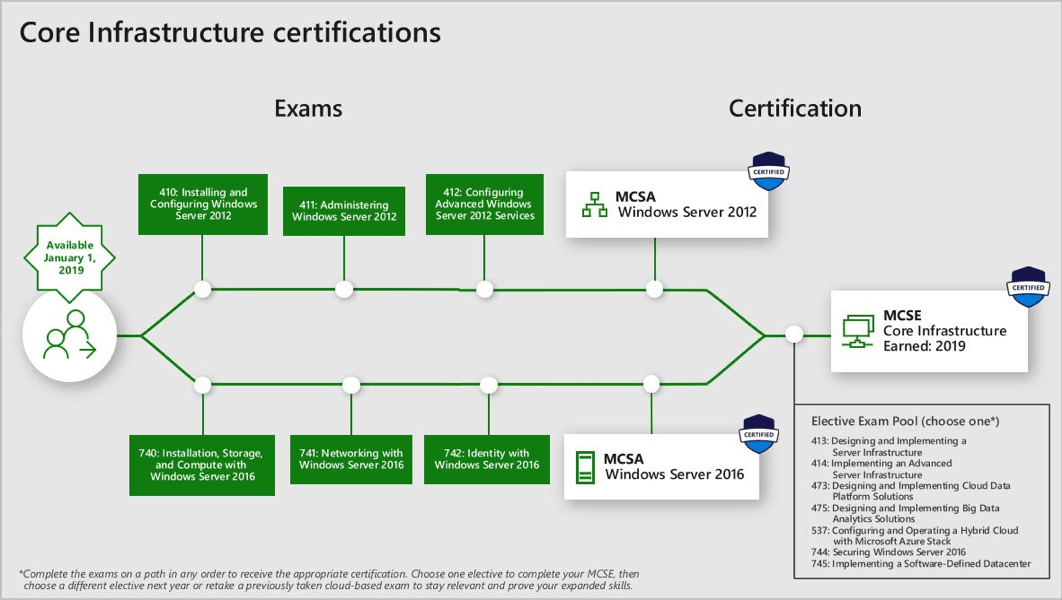
MCSE Core Infrastructure
The MCSE: Cloud Platform and Infrastructure certification will be retired at the end of 2018 but the MCSE (Microsoft Certified Solutions Expert) certification will continue.
The new MCSE: Core Infrastructure certification is currently being released and should be available January 1, 2019.
Step 1: Earn certifications for either:
- MCSA Windows Server 2012
- MCSA Windows Server 2016
Step 2: Take one of the following exams.
- 413: Designing and Implementing a Server Infrastructure
- 414: Implementing an Advanced Server Infrastructure
- 473: Designing and Implementing Cloud Data Platform Solutions
- 475: Designing and Implementing Big Data Analytics Solutions
- 537: Configuring and operating a Hybrid cloud with Microsoft Azure Stack
- 744: Securing Windows Server 2016
- 745: Implementing a Software-Defined Datacenter
Step 3: Earn your MCSE Core Infrastructure Certification
Step 4: Continued Education
Your MCSA: Windows Server 2016 certification equips you for a position as a network or computer systems administrator or as a computer network specialist, and it is the first step on the way to becoming a Microsoft Certified Solutions Expert (MCSE).
There are three exams to pass to earn your MCSA Windows Server 2016 certificate.
- Exam 70-740: Installation, Storage, and Compute with Windows Server 2016
- Exam 70-741: Networking with Windows Server 2016
- Exam 70-742: Identity with Windows Server 2016
Microsoft Role Based Certifications
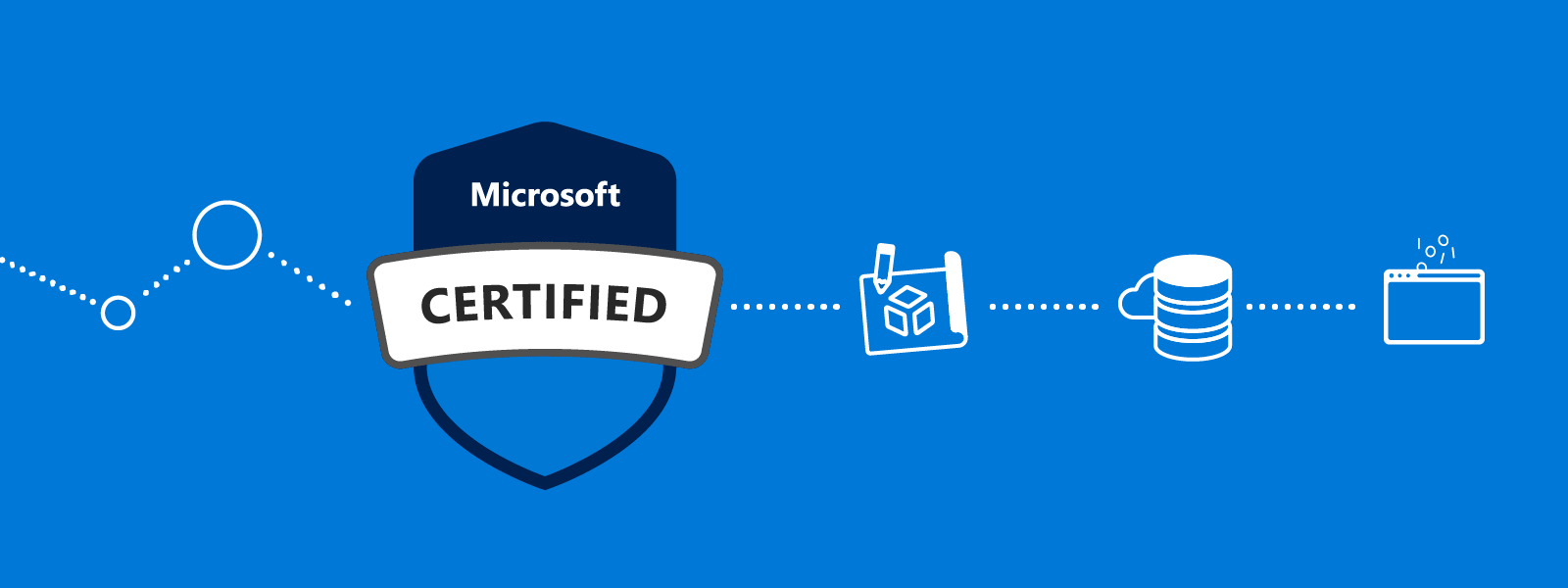
Microsoft Role Based Certifications
Decades ago, when computer technology was still very young, Information Technology was a generalist job, meaning, you learned how to do the same basic tasks on a handful of different systems. Some required specific certifications, while others required adapting your training to fit a new system.
Today, everything is different. The possibilities in online, cloud-based services, mobile technology, and more has blown the IT industry wide open.
Microsoft is now offering role-based solutions that match up IT training with specific roles served within IT departments. This provides two main benefits to industries and to you.
First, it provides a host of newly trained workers for the industry, who are trained with in the latest technology in the specific areas of need.
Second, it allows workers to fast-track their training that matches actual job openings, rather than spending months learning skills and platforms that may or may not have related job opportunities.
A Change of Focus from Platform to Role Based Certifications
The expansion of IT possibilities has brought about this change in philosophy and focus.
Training according to different platforms is no longer enough. Today we train for the specific role required within those platforms. In some cases, these roles function across a variety of platforms, but the job roles are distinct.
What are some examples of these job roles? There are developers, administrators, and solutions architects – which expand on the traditional “troubleshooter” role.
Each of these roles needs to know the platform well, but they use the platforms in critically unique ways.
There continue to be specific paths and certifications around mobility, cloud platform and infrastructure, productivity, data management and analytics, app building, and business applications. There are certifications for desktop, server, database, and developer work.
There is something for everyone in IT, and Microsoft Certifications will give you the skills to meet the job opportunities available to you today.
Azure Administrator (MCA Azure Administrator)
Azure Administrators are responsible for implementing, monitoring, and maintaining Microsoft Azure solutions. These include major services related to compute, storage, network, and security.
There are two exams to take to become an MCA Azure Administrator
- Exam AZ-103: Azure Administrator
Next, continue on to Microsoft Certification for Azure Solutions Architects
Azure Solutions Architect (MCE Azure Architect)
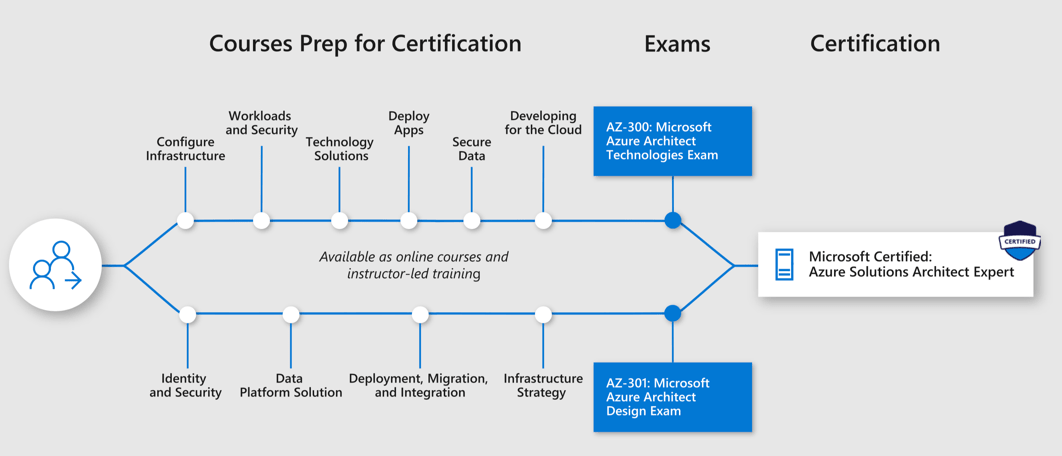
MCE Azure Architect
Master these skills to help create solutions for Azure. The Microsoft Azure Solution Architect certification requires expertise in network, storage, compute, and security.
There are two easy exams you must pass to become an Azure Solutions Architect
- Exam AZ-300: Microsoft Azure Architect Technologies
- Exam AZ-301: Microsoft Azure Architect Design
MCE Microsoft 365 Enterprise Administrator
Your Microsoft 365 Enterprise Administrator Certification will give you the skills to:
- Design, configure, and customize Microsoft 365 components
- Plan and manage identity strategy, user security, and licenses
- Implement external access
- Plan and implement a device management strategy
There are three steps to earning your Microsoft 365 Enterprise Administrator Certification.
Step 1: Pass one of these exams.
- MS-100: Microsoft 365 identity and Services Exam
- MS-101: Microsoft 365 Mobility and Security Exam
Step 2: Earn your Microsoft 365 Enterprise Administrator Certification.
Step 3: Continued Education
Microsoft Role Based Certifications – Fundamentals

Microsoft Fundamentals Certifications
The entry level certifications for the new role-based certifications path are the ‘Fundamentals’. Currently Microsoft offers three fundamental certifications:
- Microsoft Certified Dynamics 365 Fundamentals
- Microsoft 365 Certified Fundamentals
- Microsoft Certified Azure Fundamentals
Microsoft Role Based – MCA Certifications (Associate)
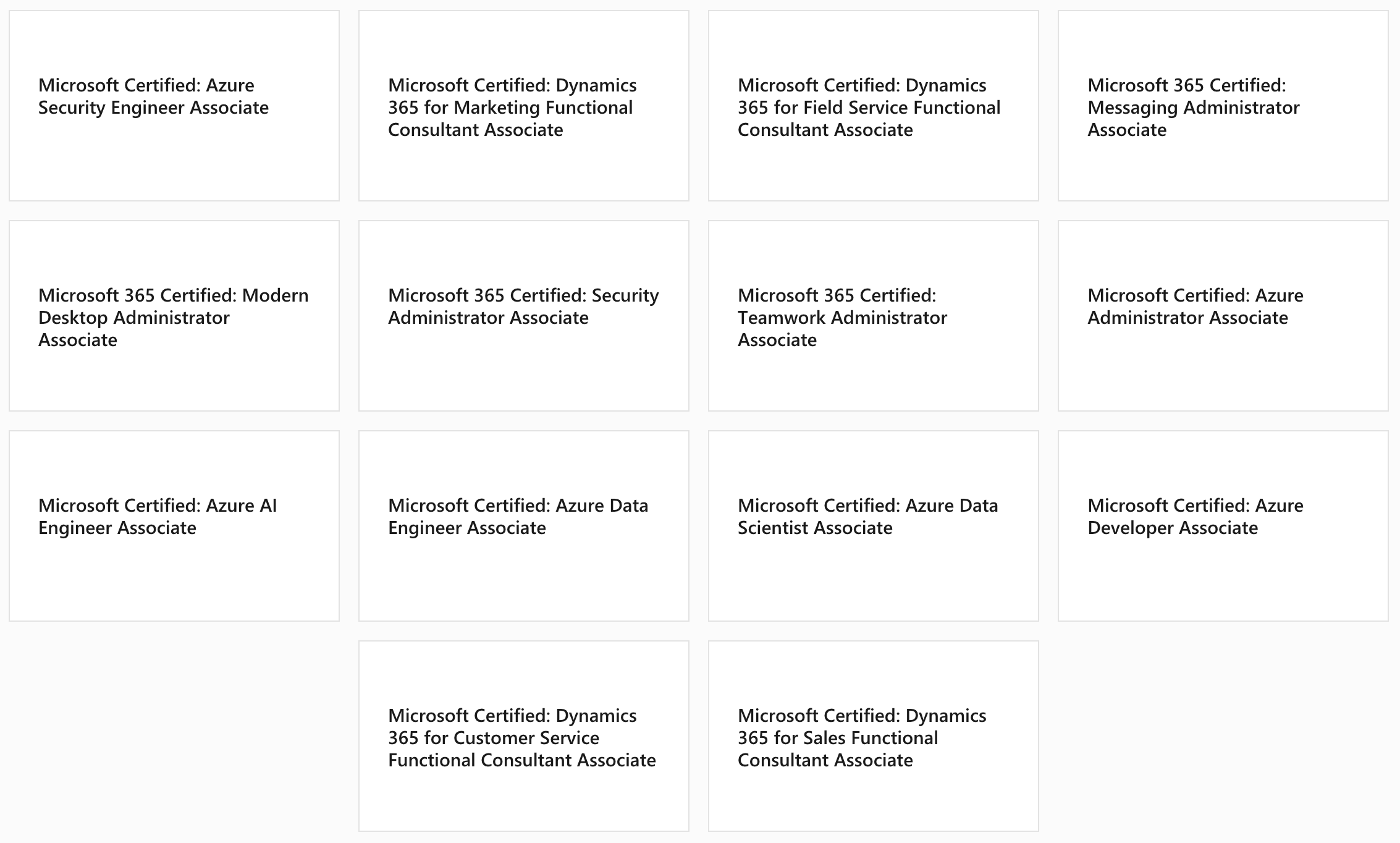
Microsoft MCA Certifications
Associate certifications are suitable for IT professional with at least two years of comprehensive working experience. They cover various technologies like Azure, Microsoft 365 and Dynamics. Although it is helpful to have related Fundamental certifications but is not required.
Microsoft Certifications Roadmap 2019
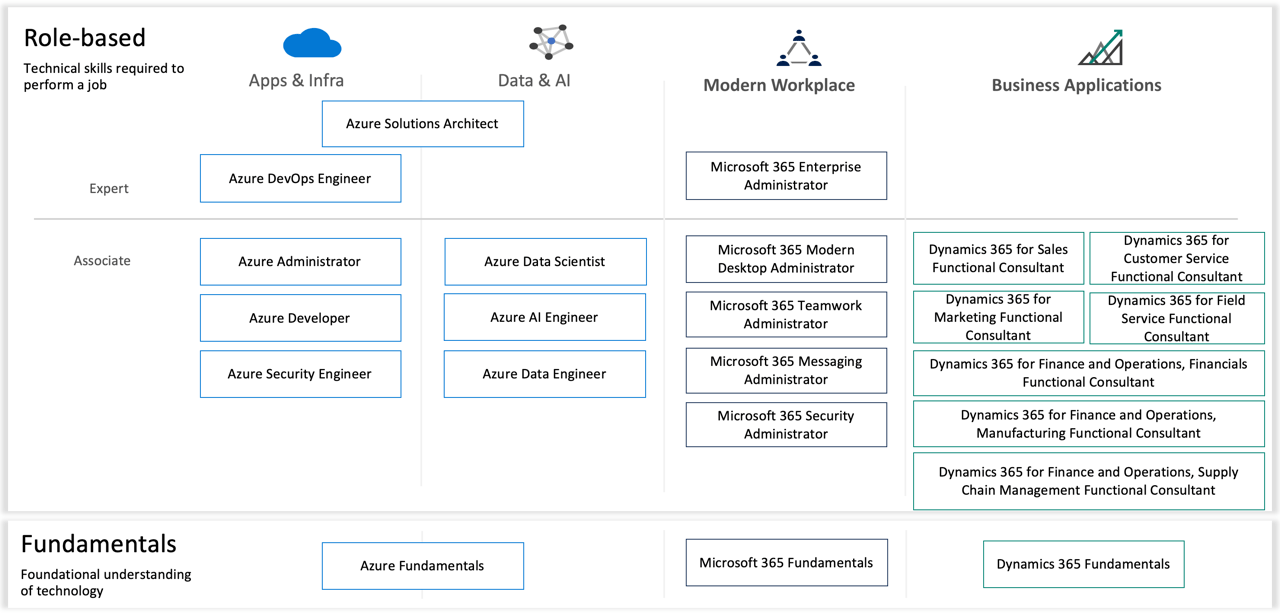
Microsoft Certifications Roadmap 2019
The image above shows the new Microsoft Certifications Roadmap for 2019. There are four certification paths you can follow and each path has three different levels of certifications: Fundamentals, Associate and Expert.
- Applications and Infrastructure training and certifications
- Data & AI training and certifications
- Modern Workplace training and certifications
- Business Applications training and certifications
The main focus is Azure, Microsoft 365 and Dynamics 365 Training.
Applications and Infrastructure Roadmap 2019
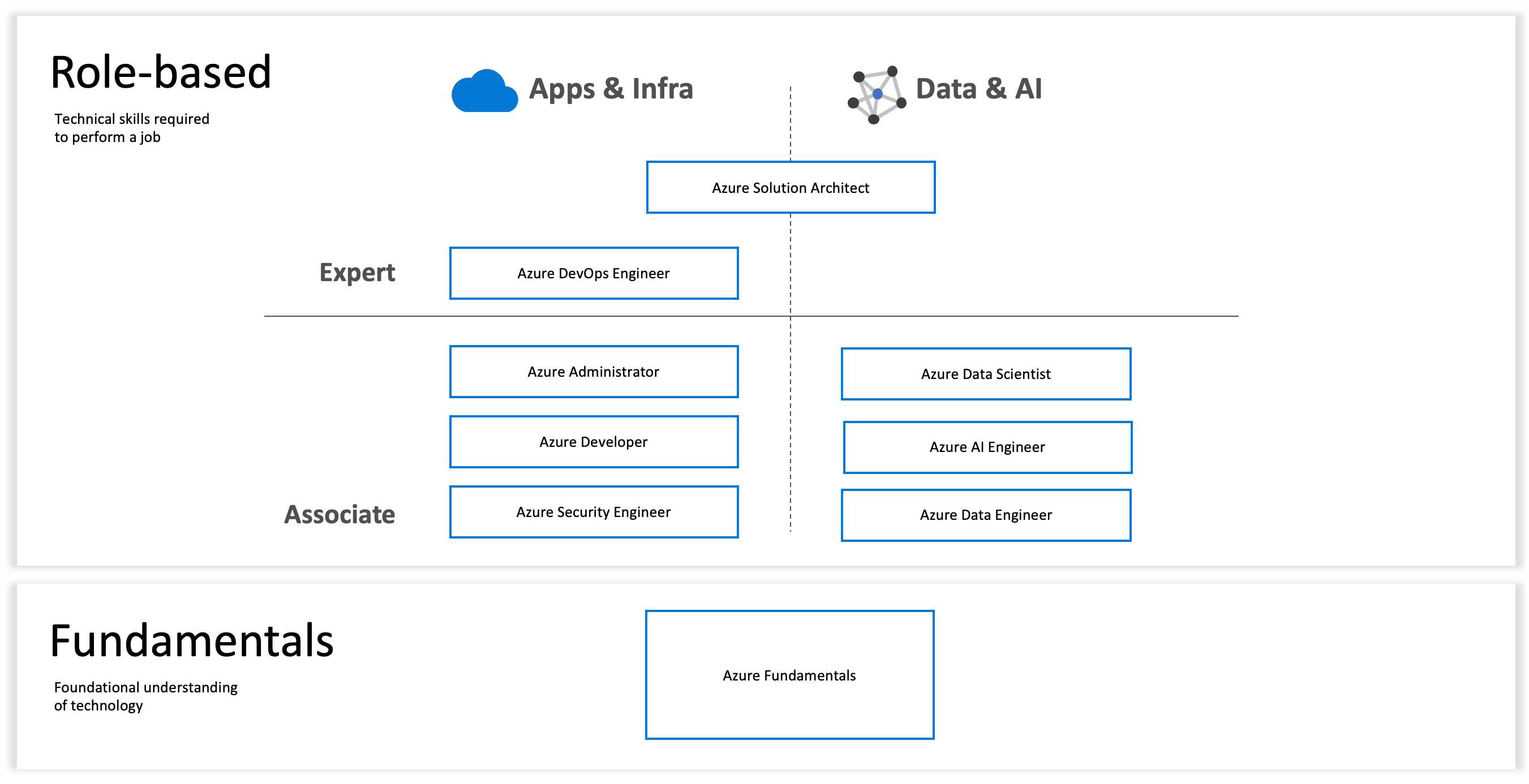
Azure Roadmap
Moden Workplace Roadmap 2019
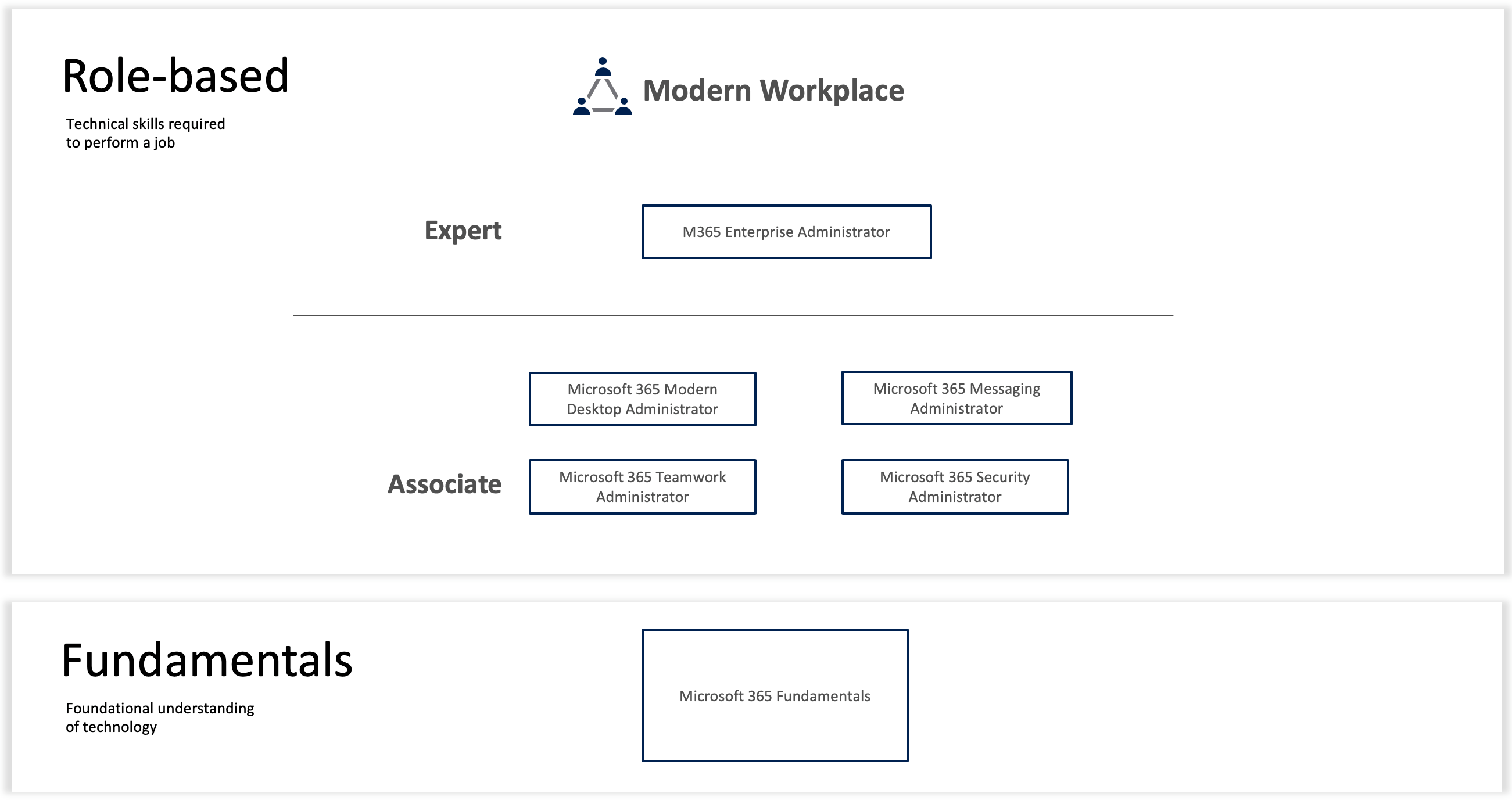
Microsoft 365 Roadmap
Business Applications Roadmap
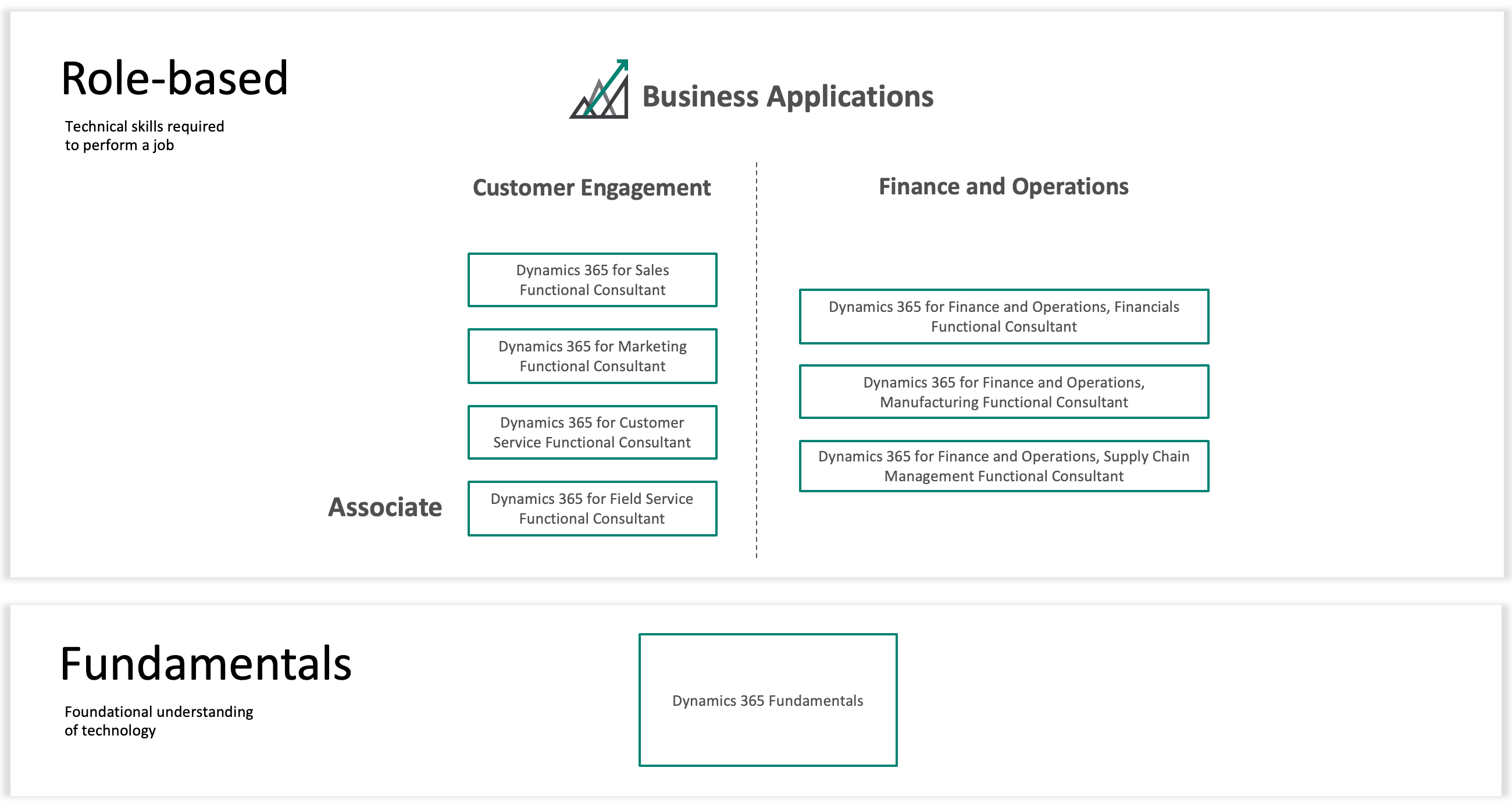
Dynamic 365 Roadmap
Microsoft Certifications are updated regularly to reflect the change of pace of business and technology. To remain technically accurate and relevant, they are updated every two months. New additional roles are added as the market requires.
Microsoft Role Based Certifications

Microsoft Role Based Certifications
Decades ago, when computer technology was still very young, Information Technology was a generalist job, meaning, you learned how to do the same basic tasks on a handful of different systems. Some required specific certifications, while others required adapting your training to fit a new system.
Today, everything is different. The possibilities in online, cloud-based services, mobile technology, and more has blown the IT industry wide open.
Microsoft is now offering role-based solutions that match up IT training with specific roles served within IT departments. This provides two main benefits to industries and to you.
First, it provides a host of newly trained workers for the industry, who are trained with in the latest technology in the specific areas of need.
Second, it allows workers to fast-track their training that matches actual job openings, rather than spending months learning skills and platforms that may or may not have related job opportunities.
A Change of Focus from Platform to Role Based Certifications
The expansion of IT possibilities has brought about this change in philosophy and focus.
Training according to different platforms is no longer enough. Today we train for the specific role required within those platforms. In some cases, these roles function across a variety of platforms, but the job roles are distinct.
What are some examples of these job roles? There are developers, administrators, and solutions architects – which expand on the traditional “troubleshooter” role.
Each of these roles needs to know the platform well, but they use the platforms in critically unique ways.
There continue to be specific paths and certifications around mobility, cloud platform and infrastructure, productivity, data management and analytics, app building, and business applications. There are certifications for desktop, server, database, and developer work.
There is something for everyone in IT, and Microsoft Certifications will give you the skills to meet the job opportunities available to you today.
Microsoft Certifications by Technology
The Microsoft certification paths outlined above group certifications by category but we know that most students want to know what Microsoft certifications are available per technology.
Here is an overview of certifications grouped by technology.
-
- Microsoft 365
- MCA: Modern Desktop Administrator
- MCA: Microsoft 365 Teamwork Administrator Associate
- MCA Microsoft 365 Modern Desktop Administrator
- MCE: Microsoft 365 Enterprise Administrator
- MCA Microsoft 365 Security Administrator Associate
- Microsoft 365
-
- SQL Server
- MCSA: SQL 2016 Database Administration
- MCSA: SQL 2016 Database Development
- MCSA: SQL 2016 Business Intelligence Development
- MCSA: SQL 2016 BI Reporting
- MCSA: SQL 2016 Data Engineering with Azure
- MTA: Database SQL Server
- SQL Server
-
- Windows Server
- MCSA: Windows Server 2016
- MCSA: Windows 2016 UPGRADE
- MCSE: Cloud Platform & Infrastructure (Security)
- MTA: IT Infrastructure Windows Server
- Windows Server
-
- Exchange Server
- MCSE: Productivity – Exchange 2016
- Exchange Server
-
- Sharepoint Server
- MCSE Productivity SharePoint 2016 Administrator
- Sharepoint Server
-
- Microsoft Azure
- MCA: Azure Administrator
- MCA: Azure Developer
- MCE: Azure Solutions Architect
- MCE Microsoft Azure DevOps
- Microsoft Azure
Retired Certifications
The following Microsoft Certifications have retired and are no longer available:
- MCSE Mobility
- MCSA Windows 10
- MCSA Office 365
- MCSE Cloud Platform
- MCSA Linux on Azure
- MCSA Cloud Platform
- MCSA Microsoft Dynamics 365
MCSE Mobility
The MCSE (Microsoft Certified Solutions Expert) Mobility certificate shows that you have mastered the skills to work in a mobile-friendly, BYOD (bring your own device) workplace.
There are four steps required to become MCSE Mobility Certified.
Step 1: Improve your skills with a MCSA Windows 10 certification
Step 2: Pass one of the following exams:
- Exam 70-695: Deploying Windows Desktops and Enterprise Applications
- Exam 70-703: Administering Microsoft System Center Configuration Manager and Cloud Services Integration
Step 3: Earn your MCSE: Mobility Certification
Step 4: Continued Education
UPDATE: The MCSE Mobility certification has retired and is no longer available.
MCSA Windows 10
This certification gives you skills to configure devices that run Windows 10. This is a foundational certificate showing that you possess the basic skills to understand Windows 10 security and to integrate Azure features. With this certification, you will be able to:
- Manage identity, data access and protection, work in remote access, manage apps, and assist in updates and recovery.
- Plan deployments for Windows 10 desktops and devices.
- Work with Microsoft Intune device management solution.
- Configure Microsoft networking and storage
There are two exams required to get Windows 10 Certified.
- Exam: 70-697: Configuring Windows Devices
- Exam: 70-698: Installing and Configuring Windows 10
UPDATE: The MCSA Windows 10 certification has retired and is no longer available. It has been replaced with MCA Microsoft 365 Modern Desktop Administrator
MCSA: Office 365
This certification shows that you have the basic skills to help businesses transition to and administrate cloud-hosted business applications with Microsoft Office 365. This initial MCSA certification helps you:
- Evaluate, plan, deploy and operate Office 365 services, including its dependencies, requirements and supporting technologies.
- Demonstrate your experience with the Office 365 Admin Center and your overall knowledge of Exchange Online, Lync Online, SharePoint Online, Office 365 ProPlus and Azure Active Directory.
There are two exams required for this certification.
- Exam 70-346: Managing Office 365 Identities and Requirements
- Exam 70-347: Enabling Office 365 Services
UPDATE: The MCSA Office 365 certification has retired and is no longer available. It has been replaced with MCE Microsoft 365 Enterprise Administrator (Office 365)
MCSE Cloud Platform
MCSE Cloud Platform and Infrastructure certification shows your skills in running a highly efficient and data center, and your expertise in cloud technologies, identity management, systems management, storage, virtualization, and networking.
Achieving an MCSE: Cloud Platform and Infrastructure certification gives you credentials for jobs such as cloud administrator, cloud architect, computer support specialist, and information security analyst.
Here is how you earn your MCSE in Cloud Platform and Infrastructure:
Step 1: Achieve one of these MCSA (Microsoft Certified Solutions Associate) certifications.
- MCSA Windows Server 2016
- MCSA Linux on Azure
- MCSA Cloud Platform
Step 2: Pass one of these elected exams.
- 70-413: Designing and Implementing a Server Infrastructure
- 70-414: Implementing an Advanced Server Infrastructure
- 70-473: Designing and Implementing Cloud Data Platform Solutions
- 70-475: Designing and Implementing Big Data Analytics Solutions
- 70-532: Developing Microsoft Azure Solutions
- 70-533: Implementing Microsoft Azure Infrastructure Solutions
- 70-535: Architecting Microsoft Azure Solutions
- 70-537: Configuration and Operating a Hybrid Cloud with Microsoft Azure Stack
- 70-744: Securing Windows Server 2016
- 70-745: Implementing a Software-Defined Datacenter
Step 3: Earn your MCSE Cloud Platform and Infrastructure
Step 4: Continued Education
UPDATE: The MCSE Cloud Platform and Infrastructure certification has retired and is no longer available.
MCSA Linux on Azure
This certification shows your ability to:
- Design, architect, implement, and maintain multi-faceted, cloud-enabled, Linux® solutions that use Microsoft Azure open source capabilities.
- Show your Linux system administration skills
- Demonstrate that your fluency in the cloud-native world of businesses today.
There are two exams required to earn this certification.
- Exam 70-533: Implementing Microsoft Azure Infrastructure Solutions
- Linux Foundation Certified System Administrator (LFCS) Exam
UPDATE: The MCSA Linux on Azure certification has retired and is no longer available.
MCSA Cloud Platform
This certification provides the basis for a career as a cloud administrator or architect.
To earn the MCSA: Cloud Platform, you must pass any two of the following exams.
- Exam 70-532: Developing Microsoft Azure Solutions
- Exam 70-533: Implementing Microsoft Azure Infrastructure Solutions
- Exam 70-535: Architecting Microsoft Azure Solutions
- Exam 70-537: Configuring and Operating a Hybrid Cloud with Microsoft Azure Stack
- Exam 70-473: Designing and Implementing Cloud Data Platform Solutions
- Exam 70-475: Designing and Implementing Big Data Analytics Solutions
UPDATE: The MCSA Cloud Platform certification has retired and is no longer available.
MCSA: Microsoft Dynamics 365
The MCSA: Microsoft Dynamics 365 provides the basis for a position as a Dynamics 365 developer, implementation consultant, technical support engineer, or system administrator and it is the the initial step toward a Business Applications Microsoft Certified Solutions Expert (MCSE).
You must pass the following two exams to be granted this certification.
- Exam MB2-715: Microsoft Dynamics 365 customer engagement Online Deployment
- Exam MB2-716: Microsoft Dynamics 365 Customization and Configuration
UPDATE: The MCSA Microsoft Dynamics 365 certification has retired and is no longer available.
